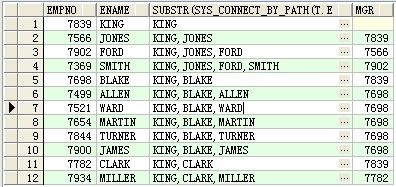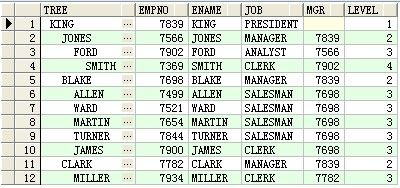HIERARCHICAL QUERIES AND SYS_CONNECT_BY_PATH
Hierarchical Queries
If a table contains hierarchical data, then you can select rows in a hierarchical order using the hierarchical query clause:
hierarchical_query_clause::=
Description of the illustration hierarchical_query_clause.gif
START WITH specifies the root row(s) of the hierarchy.
CONNECT BY specifies the relationship between parent rows and child rows of the hierarchy.
-
The
NOCYCLEparameter instructs Oracle Database to return rows from a query even if aCONNECTBYLOOPexists in the data. Use this parameter along with theCONNECT_BY_ISCYCLEpseudocolumn to see which rows contain the loop. Please refer to CONNECT_BY_ISCYCLE Pseudocolumn for more information. -
In a hierarchical query, one expression in
conditionmust be qualified with thePRIORoperator to refer to the parent row. For example,... PRIOR expr = expr or ... expr = PRIOR expr
If the
CONNECTBYconditionis compound, then only one condition requires thePRIORoperator, although you can have multiplePRIORconditions. For example:CONNECT BY last_name != 'King' AND PRIOR employee_id = manager_id ... CONNECT BY PRIOR employee_id = manager_id and PRIOR account_mgr_id = customer_id ...PRIORis a unary operator and has the same precedence as the unary + and - arithmetic operators. It evaluates the immediately following expression for the parent row of the current row in a hierarchical query.PRIORis most commonly used when comparing column values with the equality operator. (ThePRIORkeyword can be on either side of the operator.)PRIORcauses Oracle to use the value of the parent row in the column. Operators other than the equal sign (=) are theoretically possible inCONNECTBYclauses. However, the conditions created by these other operators can result in an infinite loop through the possible combinations. In this case Oracle detects the loop at run time and returns an error.
Both the CONNECT BY condition and the PRIOR expression can take the form of an uncorrelated subquery. However, the PRIOR expression cannot refer to a sequence. That is, CURRVAL and NEXTVAL are not valid PRIOR expressions.
You can further refine a hierarchical query by using the CONNECT_BY_ROOT operator to qualify a column in the select list. This operator extends the functionality of the CONNECT BY [PRIOR] condition of hierarchical queries by returning not only the immediate parent row but all ancestor rows in the hierarchy.
SYS_CONNECT_BY_PATH
Syntax
Description of the illustration sys_connect_by_path.gif
Purpose
SYS_CONNECT_BY_PATH is valid only in hierarchical queries. It returns the path of a column value from root to node, with column values separated by char for each row returned by CONNECT BY condition.
Both column and char can be any of the datatypes CHAR, VARCHAR2, NCHAR, or NVARCHAR2. The string returned is of VARCHAR2 datatype and is in the same character set as column.
See Also:
"Hierarchical Queries" for more information about hierarchical queries andCONNECT
BY conditions
Examples
The following example returns the path of employee names from employee Kochhar to all employees of Kochhar (and their employees):
SELECT LPAD(' ', 2*level-1)||SYS_CONNECT_BY_PATH(last_name, '/') "Path"
FROM employees
START WITH last_name = 'Kochhar'
CONNECT BY PRIOR employee_id = manager_id;
Path
---------------------------------------------------------------
/Kochhar
/Kochhar/Greenberg
/Kochhar/Greenberg/Faviet
/Kochhar/Greenberg/Chen
/Kochhar/Greenberg/Sciarra
/Kochhar/Greenberg/Urman
/Kochhar/Greenberg/Popp
/Kochhar/Whalen
/Kochhar/Mavris
/Kochhar/Baer
/Kochhar/Higgins
/Kochhar/Higgins/Gietz
SELECT T.EMPNO, ENAME, SUBSTR(SYS_CONNECT_BY_PATH(T.ENAME, ','), 2), T.MGR
FROM EMP T
START WITH T.MGR IS NULL
CONNECT BY PRIOR EMPNO = MGR;

SELECT LPAD(' ', LEVEL * 2 - 1) || ENAME AS TREE, F.EMPNO,ENAME,JOB,MGR, LEVEL
FROM EMP F
START WITH MGR IS NULL
CONNECT BY PRIOR EMPNO = MGR;
